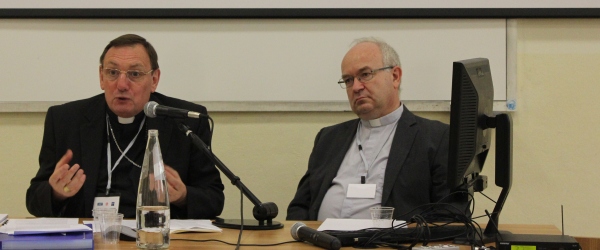
Contemporary culture reflects philosophical and anthropological thought that have certain features, which according to the Secretary of the Pontifical Council for the Family, Msgr. Jean Laffitte, ought to be emphasized.
Firstly there is “the rejection of every reference to natural law and the separation between human freedom and the nature of the human being.” As the Encyclical Veritatis Splendor (48) says, only in reference to this: for physical and biological man “it is possible to think of human nature in terms of a liberty that decides and creates the conditions for its choices.” The body, in this case, is “human material, owned by the individual, an object of pleasure that may be made available to the partner, within a relationship that is considered ‘private’ and over which the only recognized authority is that of the subject himself,” says Msgr. Laffitte.
There is, moreover, a “misuse of the term ‘nature’”—continued the Secretary of the Dicastery— “in the Christian vision of the nature, of the unity of body and soul in the human person, the natural order is the source of rationality, of the providential source, and of the laws that govern behavior.” Natural law, therefore, regulates “man’s participation in the universal nature,” which presents itself in the “precepts of natural law that communicate the objective knowledge of the moral rules of behavior”.
In this conception, in which the vital relationship between natural law and positive law is broken, “man’s dignity itself is forgotten.” In fact, as Msgr. Laffitte said in his Homily at the opening Mass of the International Work-Conference of Jurists on “The rights of the family and the challenges of the contemporary world,” recently organized by the Pontifical Council for the Family (19 to 21 September 2013), “human desires are unlimited and, therefore, there is no limit to individual claims, as the legislative madness we have seen in many countries shows.” “As jurists—said Msgr. Laffite—we are concerned about justice in the broadest sense of the term, which does not limit itself, indeed, to satisfying individual demands.” “As Catholic jurists, we want to be inspired by the righteousness that comes from God and of which the Gospel gives us extraordinary illustrations. As Catholic jurists, we are led to refer our desires for justice and our sincere and profound search for justice to what the Lord has shown and realized,” the Secretary concluded. “The family is the bearer of rights that only God, the Creator and Redeemer, has been able to give in marriage, and of which the natural law is the decipherable expression.”